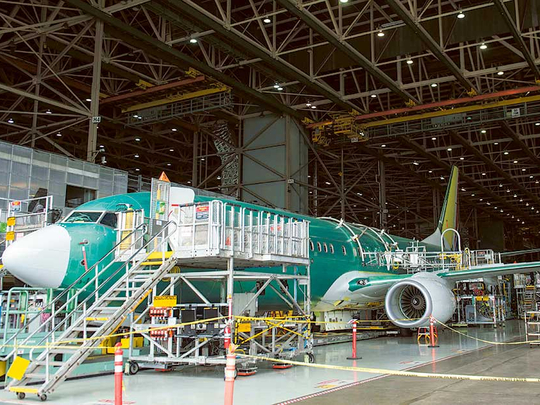
Seattle: The United States must take into consideration “fundamental issues” with regards to its relationship with the Gulf states when making a decision on the Open Skies agreements that have become the subject of controversy in the US, said Marty Bentrott, Vice President, Sales for the Middle East, Russia and Central Asia.
US carriers American Airlines, United Airlines and Delta have urged the Obama administration to look into allegations leveled by them accusing Gulf carriers Emirates, Etihad and Qatar Airways of receiving government subsidies that defy rules of competition and hurt their international business.
The war of words between the Gulf and the American trio became so heated that the CEO of Delta Richard Anderson recently resorted to linking the Gulf carriers to the September 11 terrorist attacks in the US, only to later apologise.
Open Skies agreements are bilateral air travel agreements between nations designed to promote competition in the industry by eliminating government interference in the commercial decisions of carriers about routes, capacity and pricing.
The American trio has been campaigning hard to persuade the US administration to review the agreements with the Gulf states and prevent them from adding new routes to the United States that could their international business.
Bentrott suggested that if the US reneges on the agreements, Gulf states may reconsider other aspects of their relationship with America, away from the airlines industry.
Landing slots
Last month, the CEO of Qatar Airways Akbar Al Baker warned that his government would retaliate against a decision by the Netherlands with temporarily halt granting the carrier additional landing slots by withholding state contracts from Dutch companies.
Asked if he believed Gulf states could consider similar moves against the US, Bentrott said that he was “sure” that Gulf states would revisit their commitments in the United States if Open Skies were reconsidered.
“The carriers in the Gulf have purchased a significant amount of aircraft, and with those aircraft they had every intention of serving the global marketplace - including the United States. If that dynamic was to change, [then] yes, I’m sure they would revisit their commitments and see if that made sense to them on a business basis given an environment where access to markets was constrained.”
He warned however that Boeing would not be the only party to be affected by such a move:
“[This] should be a concern not so much on the Boeing company but on the part of the US, because when you look at trade between the US and the Gulf we have many important partners there. They are important partners for trade, in the fight against terrorism, and security for the region, so there are some big, fundamental issues that have to be in consideration with respect to any decisions that are made with regards to things like Open Skies,” he told Gulf News.
Taking sides
American logistics giant FedEx, low-cost carrier Jet Blue and the US Travel Association have thrown their weight behind the Gulf carriers in a move that could ease pressure on the Obama administration to reconsider the agreements. While Boeing has said that it supports Open Skies, it has refrained from taking sides in the debate.
The UAE is the fourth biggest export market for the US State of Washington, where Boeing is based. In 2014 alone, the state exported goods worth $3.2 billion (Dh11.7 billion) to the UAE, according to the United States Census Bureau. Civilian aircraft, engines and parts are the state’s number one export. A strong gesture of support from Boeing for the Gulf carriers could therefore could act as a significant counterweight to the campaign by the American trio.
“Everybody is going to debate whether or not [our] position is strong enough [but] we have to recognise that we have some very important customers on both sides of this debate so I don’t think it’s in our best interest to in a public forum to be leaning one direction or the other,” said Bentrott.
Bentrott refused to say whether Boeing was involved in lobbying politicians in Washington, DC against reconsidering Open Skies, but said that it was “providing facts”.
“One of our jobs is to make sure that people are educated and we have been doing this in terms of the value of job creation, the value of economic development here,” he said.












